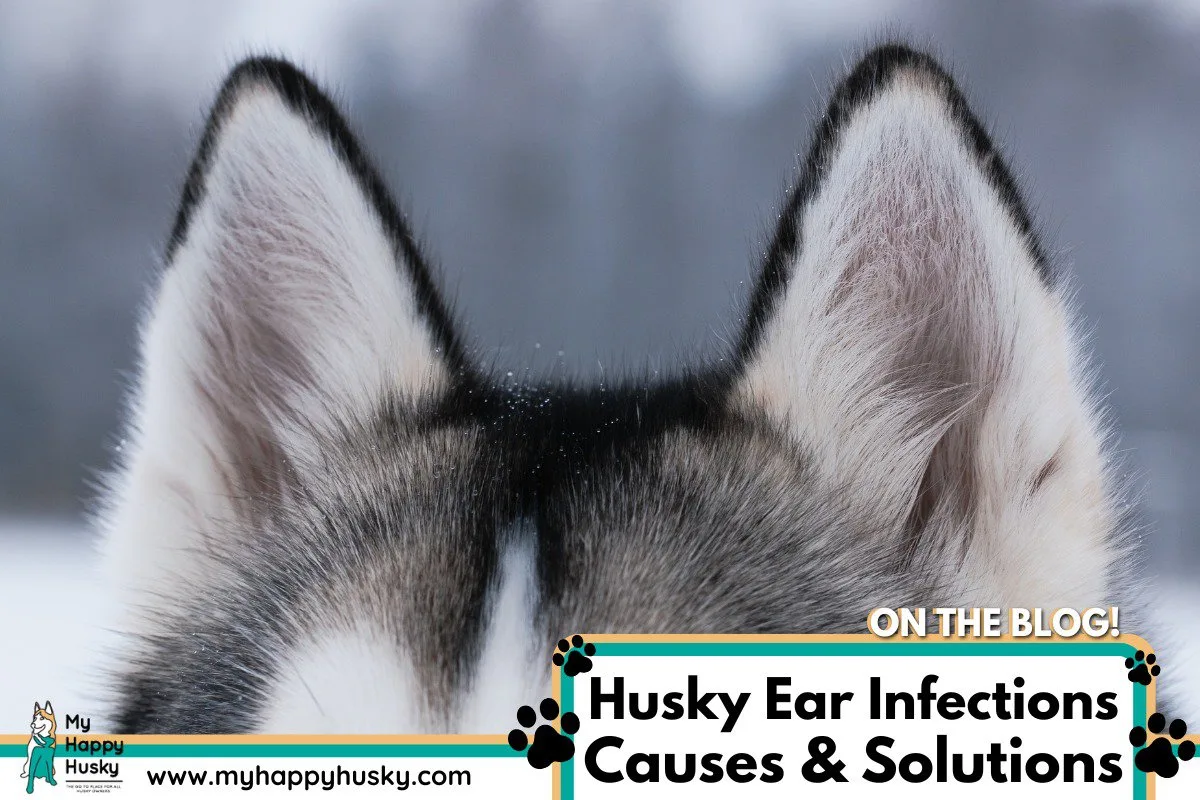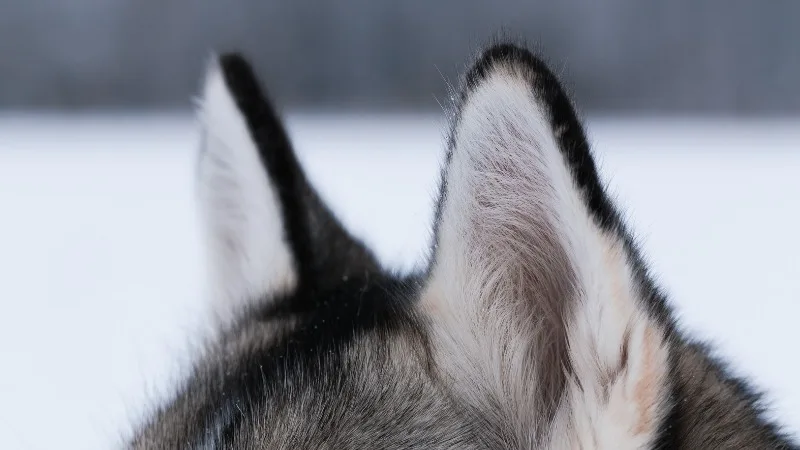With most huskies boasting tall upright ears, ear infections aren’t all that common. Still, they can certainly happen. I know!
Over the years I’ve helped countless owners resolve their huskies ear infections and provided tips to help prevent it from happening again.
I’ll explain how to identify an ear infection, the typical causes, types of ear infections and most importantly, the next steps you can take to fix this issue asap.

Identifying an Ear Infection in Your Husky
Recognizing an ear infection in your Husky starts with understanding their behavior.
If your huskies goes from their regular playful goofy behavior to suddenly uncomfortable or quiet, it means something isn’t quite right… If you pair this behavior with the following, then it could suggest an ear infection.
➡️ The most common signs of an ear infection:
- Excessive scratching and pawing at the ear: If your Husky is continually scratching their ear or shaking their head, this is a common symptom that something is wrong.
- Redness and swelling: Upon inspection, an infected ear may appear red and swollen.
- Unpleasant smell: Ear infections often produce a strong, unpleasant odor.
- Discharge: A noticeable discharge, which may be yellow, brown, or bloody, is another indicator.
- Balance problems: In severe cases, an ear infection may cause your Husky to stumble or walk in circles.
If the ear infection is obvious with exaggerated symptoms then the best thing to do is contact your veterianrian.
As I’ll explain below, you can’t always solve ear infections at home without the help of a vet. But of course I’ll highlight when you can!
7 Home Remedies to Ear Mites In Dogs!
My Personal Experience
Living in a tropical country with fairly warm temperatures, I come across a lot of huskies who spend their days splashing around in the ocean. And that’s great, it keeps them cool and they have the time of their lives. The thing is, they constantly get water in their ears and for this reason ear infections are fairly high here. The solution? Well, apart from plugging up the ears which isn’t practical, I’ve asked the owners to reduce the amount their husky gets wet. This has worked for most, thankfully!
Causes of Ear Infections in Huskies
Huskies don’t typically get ear infections, which is thanks to their ears being open and free. Tall standing ears are the least prone to ear infections as they can easily dry and remain unclogged.
Those breeds with long hairy floppy ears are the most prone to ear infections.
➡️ Still, they can happen even in huskies, and here are the typical causes:
- Allergies: Allergies to certain foods, pollens, mold, or even dust mites can lead to ear infections. Thankfully, huskies are a little less prone to allergies than other breeds.
- Bacterial and yeast infections: These are the most common causes of ear infections in dogs. The warm, moist environment in the ear can be an ideal breeding ground for these microorganisms.
- Foreign bodies: If something gets stuck in your Husky’s ear, like a grass seed, it can lead to an infection.
- Parasites: Mites are a common cause of ear infections, particularly in puppies.
- Underlying medical conditions: Some diseases, like hypothyroidism or autoimmune diseases, can make your Husky more susceptible to ear infections.
Keeping your husky’s ears dry will play a big part in preventing ear infections. This is why it’s important bathe your husky with caution around this sensitive area.

When It’s Time to See a Vet
While you can often treat ear infections at home, there are times when it’s necessary to head straight to your vets.
Unfortunately, if the ear infection is already fairly developed with visible infection, then it’s not worth trying to solve this at home.
➡️ Here’s when you should take your husky to the vet:
- Persistent Symptoms: If you notice your Husky exhibiting symptoms such as head shaking, excessive scratching at the ears, loss of balance, or any behavioral changes that last for more than a day, it’s time to consult your vet.
- Visible Signs of Infection: If upon checking your Husky’s ears, you observe redness, swelling, or a discharge (which could be brown, yellow, or bloody), these are clear signs of an infection. An unpleasant odor from the ears is another indicator.
- Inability to Eat or Sleep: Severe ear infections can be extremely uncomfortable and may disrupt your Husky’s regular eating and sleeping patterns. If you observe your Husky skipping meals or restless during the night, an ear infection might be the cause.
- Recurrent Ear Infections: If your Husky experiences recurring ear infections, there could be an underlying issue that needs to be addressed. Recurring infections can also lead to more serious complications like otitis media and interna, which affect the middle and inner ear, respectively.
- Non-responsiveness to Home Care: If you’ve been treating a mild ear infection at home and see no improvement or even worsening symptoms, this is a sign that professional veterinary care is required.
Natural Remedy Tips for Fixing Husky Ear Infections
Types of Ear Infections and Treatments
There are three types of ear infections that can affect your Husky, based on which part of the ear the infection is located.
- Otitis externa: This is an infection of the outer ear canal and is the most common type.
- Otitis media: This is an infection of the middle ear and often occurs if otitis externa is not properly treated.
- Otitis interna: This is an infection of the inner ear and is the most serious type, potentially leading to neurological problems.
Treatment usually depends on the cause and type of the infection. It’s important to consult with a veterinarian who can diagnose the type of infection and the best course of treatment. This can include:
- Topical medications: This is the most common treatment for otitis externa. It usually involves cleaning the ear thoroughly and applying an antibiotic, antifungal, or anti-inflammatory ear drop.
- Oral medications: If the infection is severe or involves the middle or inner ear, oral or injectable medication might be required.
- Parasite treatments: If the cause is mites or other parasites, specific treatments will be needed to eliminate them.
- Surgery: In severe or recurrent cases, surgery might be necessary. This is particularly true for dogs with anatomical issues that make them prone to recurrent infections.
- Allergy treatments: If the cause of the ear infection is an allergy, your vet will help identify the allergen causing the reaction. Depending on what’s causing the allergy, treatments could range from changes in diet to medication that helps control the allergic reaction.
- Addressing underlying conditions: If the ear infection is due to an underlying medical condition, like hypothyroidism or an autoimmune disease, treating these conditions can help prevent future infections.
- Ear cleaners: Regular use of a veterinary-approved ear cleaner can help keep your Husky’s ears clean and dry, reducing the likelihood of infections.
Preventing Ear Infections
Prevention is always better than cure, especially when it comes to your Husky’s health. Here are some preventive measures to reduce the risk of ear infections:
- Regular ear checks: Regularly inspect your Husky’s ears for signs of infection. This can help catch potential problems early before they become serious.
- Proper ear cleaning: Regular cleaning can help prevent the buildup of wax and debris that can lead to infections. Always use a vet-approved cleaner and follow their instructions carefully. Avoid using cotton swabs as they can push debris further into the ear.
- Diet and nutrition: A balanced diet boosts your Husky’s immune system, making them less likely to get infections. If food allergies are a problem, a hypoallergenic diet may be recommended by your vet.
- Manage allergies: If your Husky has allergies, managing them can help prevent ear infections. This may involve medications, special diets, or reducing exposure to allergens.
- Regular vet checks: Regular veterinary check-ups can help identify any potential issues early, including ear infections.
- Keep ears dry: Moisture creates an environment for bacteria and yeast to thrive. Dry your Husky’s ears thoroughly after swimming or bathing.
By being aware of the signs and causes of ear infections, you can help ensure your pet remains healthy and happy.
Always seek veterinary advice if you suspect your Husky has an ear infection. They can provide the appropriate treatment options and guidance on how to prevent future infections.
With proper care, ear infections can be effectively managed and even prevented, allowing your Husky to live a long, comfortable life.
Disclaimer
The advice given in this article is for educational purposes only and does not constitute professional advice in any context. Before making any decisions that may affect the health and/or safety of your dog, you should always consult a trained veterinarian in your local area. For the FULL disclaimer Visit HereCopyright Notice: The content produced and published on My Happy Husky is unique and original. My Happy Husky makes an active effort to search for plagiarized content using plagiarism detection software. If plagiarized content is found, action will be taken.
